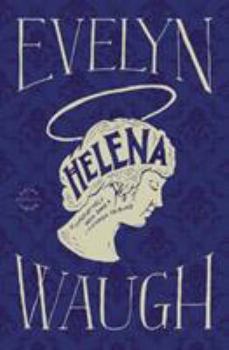Helena
Select Format
Select Condition 
Book Overview
Evelyn Waugh's personal favorite of his novels and "a superlatively well done book" (Chicago Tribune) set in the age of Emperor Constantine. Helena is the intelligent, horse-mad daughter of a British chieftain who is thrown into marriage with the man who will one day become the Roman emperor Constantius. Leaving home for lands unknown, she spends her adulthood seeking truth in the religions, mythologies, and philosophies of the...
Format:Paperback
Language:English
ISBN:0316216518
ISBN13:9780316216517
Release Date:December 2012
Publisher:Back Bay Books
Length:256 Pages
Weight:0.55 lbs.
Dimensions:0.9" x 5.4" x 8.2"
Related Subjects
Fiction Genre Fiction Historical Literary Literature & Fiction Religion & SpiritualityCustomer Reviews
5 ratings
A Lesser Known Waugh Classic
Published by Thriftbooks.com User , 14 years ago
Helena is one of Evelyn Waugh's lesser known works, but it deserves to be more widely read. It is a fictional biography of St. Helena, the mother of the Emperor Constantine. She is supposed to have discovered the True Cross and identified the sites of Calvary, Jesus' Tomb, and other episodes in the life of Christ. Helena is a good example of Waugh's ability to write clearly and wittily and also of his deep Catholic faith. Most of Helena's life is clearly legendary, but nevertheless Waugh does an excellent job of bringing her to life and giving her a definite personality while demonstrating her (and his) deep religious devotion.
different from the lives of saints
Published by Thriftbooks.com User , 15 years ago
Perhaps a little to idealized about Helena, but less so than the L.O.S. Waugh's book feels like how he imagines Helena to have been, and you'll feel it too.
Queen of Hearts
Published by Thriftbooks.com User , 16 years ago
Prostitute, stable-hand, or British princess? The legends swirl around Helena, wife or mistress of Constantius Chlorus ("The Green"), a Roman officer who is eventually created co-Emperor. In this delicate, hilarious fantasy Waugh takes the advice of his friend and fellow convert to Catholicism, Ronald Knox; he goes "up the nursery stairs" to find Helena in rhymes of Old King Coel and tales of princesses in towers. Along the way he finds an ardent, imaginative, and entirely lovable girl who marries the dour and priggish Constantius, and is discarded by his ambitious divorce and re-marriage to become co-Emperor. In middle-age she sees her son Constantine become Emperor, extremely eccentric "Christian," and murderous tyrant. She retains her passion for life, and falls in love with the Church newly emerged from persecution. Waugh repeatedly refers to Heinrich Schliemann's similar attitude towards Homer and the legends of Troy. Stubbornly as any child, she searches for the solid objects of Christianity: A real, cheaply-constructed wooden cross; a smelly cave used as a stable in Bethlehem; stairs from a Roman governor's residence. Nothing is legendary or metaphorical to Helena, who identifies with the Magi, those royal astrologers journeying so far, compounding with the infanticidal Herod, presenting their curious gifts, and fading into legend. Her souvenirs are in the crypt of Santa Croce in Gerusalemme in Rome, once the household chapel of the palace her son gave to her, wistful as a child's toys and as moving.
Archly Funny but Still Respectful
Published by Thriftbooks.com User , 18 years ago
This is a very different sort of historical fiction. Waugh does evoke the time and place of the fourth Century Roman Empire but he never leaves you to really imaginatively enter into that world. He's always at your side, nudging the careful reader in the ribs to share a laugh at the expense of self-important intellectuals or effete no-talent artists trying to pass off their lack of ability as refined aesthetic sensibility. Some laughs, he throws in just for the fun of it and because he can (look for the thinly veiled nursery rhyme allusion on page 32). There are a handful of passages that are worth the price of the book all by themselves: the account of Fausta's demise, the conversation between Constantine and the architect and artist working on his triumphal arch, and the prayer of Helena to the three Magi at the grotto in Bethlehem on the feast of Epiphany, to name just a few. This volume is highly recommended, though much different than Waugh's more traditional biography of Edmund Campion, which has its own sort of excellence.
St. Helena And The Search For The Cross
Published by Thriftbooks.com User , 22 years ago
Evelyn Waugh wrote very funny, sophisticated novels about the British upper and bohemian classes. His short novel Helena is set in the late Roman empire, long before those categories existed, at least as we know them. It is about the mother of Constantine the Great, the first Christian emperor, and her search for the True Cross in fourth century Palestine, after a life of imperial politics that took her from one end of the known world to the other. She was not active in politics, but born and married into it, being the daughter of a British Celtic chief (whom Waugh names Cole)and the wife of Chlorus, a Roman aristocrat and soldier who was the father of the future emperor. The first two-thirds of the book is a beautifully written fictional account of her life at the top, and we discover that after all there was an upper class with bohemian hangers-on not unlike Britain's in the last century. Waugh creates a completely convincing imperial court that is treacherous and sophisticated, and a very convincing saint who discovers her purpose in life in it. The supporting figures in the novel--a tutor; an architect; a humble, over-worked bishop; a pair of coniving witches--are among the best things in the book.




